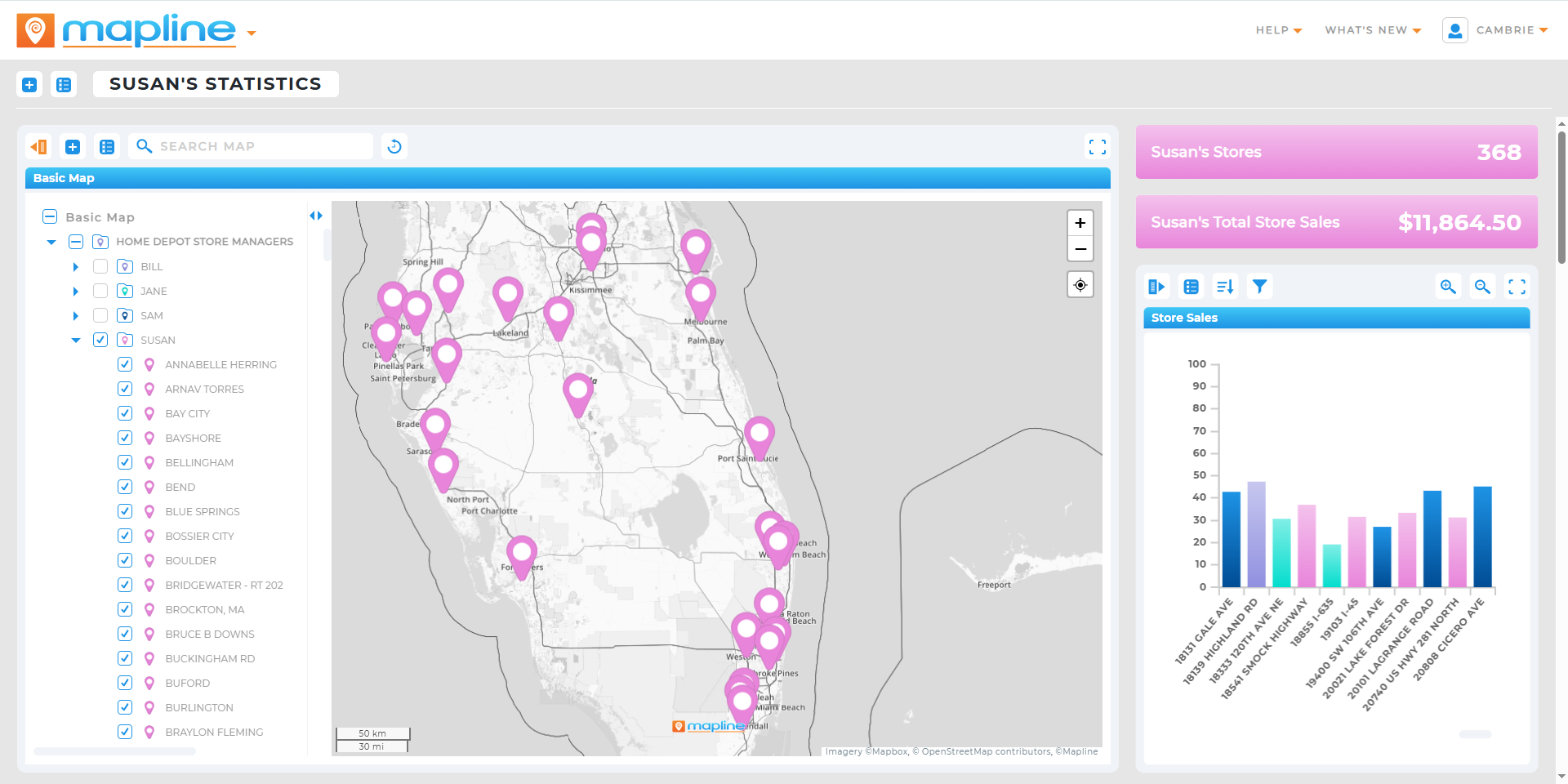In a fast-changing business landscape, rigid reporting systems no longer cut it. Agile teams need real-time answers, not reports that take days to run or dashboards that require data teams to maintain. That’s why companies are trading static reporting tools for a flexible BI platform built for speed, adaptability, and self-service analytics: Mapline.
Modern business intelligence platforms empower decision-makers across departments to explore data, spot trends, and act fast. Whether it’s marketing testing campaign performance, HR tracking turnover, or sales reps adjusting territory coverage, the ability to pivot quickly starts with agile data analytics. Let’s take a look at what makes a BI platform flexible—and why that flexibility fuels faster, smarter decisions.
What Makes a BI Platform “Flexible”?
A flexible BI platform adapts to how your business works, not the other way around. Instead of locking data behind complex interfaces or custom queries, it enables users to explore, filter, and share insights without requiring advanced technical knowledge. The best platforms also support rapid iteration, so teams can update visuals, dashboards, or even entire datasets on the fly.
This kind of flexibility isn’t just about features; it’s about autonomy. With self-service business intelligence tools, team members don’t have to wait in line for the data team to run a custom report. They can log in, explore data, and pull answers in minutes. That speed translates to better decision-making at every level of the organization.


Pro Tip: Need a BI platform that moves as fast as your team? Try Mapline’s Geo BI tools to create dynamic, territory-based dashboards that update in real time—no code or data science degree required.
Key Features That Enable Agile Decision-Making
When you’re choosing a BI platform, look for features that support real-time exploration, dynamic reporting, and fast decision-making across departments. Agile organizations need more than just static dashboards; they need tools that empower every team member to ask questions, drill into the data, and find answers without waiting on technical support. Features like self-service dashboards, geo-visualization, and web-based access ensure users can respond to challenges or opportunities the moment they arise.
The right BI platform should feel less like a reporting engine and more like a collaborative problem-solving tool. From marketing and sales to operations and HR, each department should be able to build the views they need in minutes, not days. These capabilities are what separate modern, high-impact BI platforms from outdated, rigid reporting systems.
Self-Service BI Tools
Self-service BI tools empower business users to run their own reports, filter data, and create custom dashboards. No SQL required: just intuitive interfaces that support drag-and-drop exploration. Unlike platforms that require IT or data engineering support, Mapline puts insight directly in the hands of operators, marketers, analysts, and executives.
BI Platform with Web-Based Access
In an increasingly remote world, agility depends on accessibility. Web-based BI tools make it easy to explore and share data from anywhere. Whether you’re presenting insights in the boardroom or reviewing metrics from the field, you need a platform that doesn’t require VPNs, downloads, or restrictive desktop installations.
Real-Time Data Visualizations
Business moves fast. Your dashboards should too. Dynamic visualizations update in real time, allowing teams to respond quickly to market changes, sales dips, or operational bottlenecks. Mapline’s geo-based dashboards allow users to layer location data over sales, service, or staffing performance to make smarter territory-based decisions.
BI Platform by Industry
Every industry has unique challenges, but agile decision-making is a universal advantage. Whether it’s managing complex logistics, tracking retail performance, or forecasting patient demand in healthcare, flexible BI platforms make it easier to adapt quickly and stay ahead. Tools like Tableau and Power BI often dominate conversations, but they come with steep learning curves or complex setups.
Mapline, by contrast, simplifies data analysis with intuitive dashboards and geo-based visualizations that make sense to every team member, regardless of technical background. Its flexibility makes it a strong fit for both fast-moving startups and enterprise organizations looking to streamline operations. By delivering the right insights to the right people at the right time, Mapline helps teams across industries turn data into real-time decisions.
BI for Retail Analytics
Retail businesses need to monitor inventory, promotions, and foot traffic in real time. While Tableau and Klaviyo offer campaign insights, Mapline excels at layering sales data over geographic trends to help retailers understand regional performance and store-level opportunities. Its territory-based visualizations make it easy to optimize distribution, promotions, and merchandising.
BI for Healthcare Teams
Healthcare organizations deal with sensitive data and time-critical insights. While traditional BI tools focus on static reporting, Mapline provides real-time location intelligence—ideal for clinic performance tracking, patient access mapping, and public health outreach. Mapline’s user-friendly dashboards also reduce the training burden for non-technical staff.
BI for Manufacturing
Manufacturers rely on efficient operations and rapid problem resolution. Many platforms like Power BI and Tableau provide strong visualization—but Mapline adds a geographic layer to production data, supply chains, and quality metrics. This helps manufacturing teams spot bottlenecks, improve vendor coordination, and plan more effectively across facilities.
BI for Logistics and Supply Chain
Agility is everything in logistics. While competitors like Qlik and Domo offer visualization tools, Mapline shines in routing, delivery optimization, and geo-fencing. By mapping every handoff, checkpoint, or delay, logistics leaders gain actionable insights to reduce delivery times and improve customer satisfaction.
Why Mapline’s BI Platform Is Built for Agility
Unlike legacy platforms that prioritize complex reports or static dashboards, Mapline was built from the ground up for rapid data exploration. It blends geographic data, BI dashboards, and field operations logic into one powerful, accessible tool. That means users can create visualizations in seconds, test strategies quickly, and respond to shifting priorities—without writing code or relying on IT.
Whether you’re running agile marketing experiments or optimizing a national sales team, Mapline’s flexible platform helps you pivot faster and make smarter decisions at scale.
A flexible BI platform is one that supports self-service analytics, real-time reporting, and on-the-fly data exploration. It allows users to adapt quickly to changing needs without relying on IT or data teams for every update.
Agility means faster decision-making. When business users can run their own reports and adjust dashboards quickly, they respond to trends, spot issues, and act on opportunities in real time.
Mapline combines self-service dashboards with geographic data and real-time updates. Users can drag and drop, apply filters, and visualize performance across regions—all without needing SQL or complex setup.
While Tableau and Power BI are powerful, they often require more technical setup and training. Mapline focuses on accessibility and speed, making it ideal for teams who need actionable insights without the learning curve.
Yes. Mapline is designed to scale with your business, offering powerful features that are accessible even for teams without dedicated analysts or developers.









